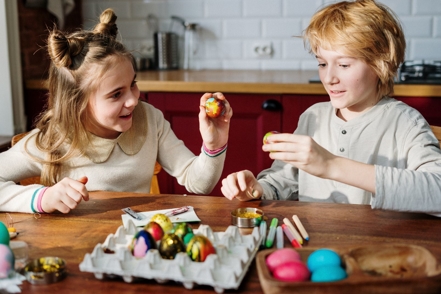 The recent COVID-19 outbreak has many families feeling a pendulum of different emotions- anxiety, stress, anger, sadness, and uncertainty about what the coming months will look like for day-to-day life. While this season is serving as a big unknown for many adults, it’s important to remember that children are especially susceptible to the negative and fearful emotions that we display. Their perception, as well as their future memories, of the COVID-19 outbreak is determined in large part to the way that the adults in their lives respond today. When children pick up on fearful emotions from their parents- the people they rely on to set the tone for their days- it can lead to stress, anxiety, and behavioral outbursts.
The recent COVID-19 outbreak has many families feeling a pendulum of different emotions- anxiety, stress, anger, sadness, and uncertainty about what the coming months will look like for day-to-day life. While this season is serving as a big unknown for many adults, it’s important to remember that children are especially susceptible to the negative and fearful emotions that we display. Their perception, as well as their future memories, of the COVID-19 outbreak is determined in large part to the way that the adults in their lives respond today. When children pick up on fearful emotions from their parents- the people they rely on to set the tone for their days- it can lead to stress, anxiety, and behavioral outbursts.
While that may be the case, the silver lining is that you, as parents, have the ability to control the way that you respond to this uncertain time while around your children. Parents play a crucial role in educating their children on the facts of COVID-19 in a way that helps them process and understand the facts of the matter, while mitigating feelings of fear and lack of control. Below are some ways that you can speak honestly with your children about the current state of affairs in a healthy manner:
Stay Calm and Offer Reassurance
When explaining COVID-19 to your children, try to maintain a calm tone of voice that promotes reassurance, rather than fear. Children will pick up not only on your words, but your projected emotion and tone as well. Remember that this goes for conversations that you have with others. Be cautious about expressing panic to other adults when your child is around, or making jokes that could scare your child.
Focus on the Facts of the Situation, Rather Than Assumptions or Opinions
Remember that your child is not the person to process “worst possible outcomes” with. When talking about COVID-19, focus on the facts of the situation as they stand and how these facts pertain to them. While it’s important for parents to have other adults who they can process with and plan for all outcomes as it relates to health, jobs and your child’s schooling, stating possible outcomes, projections or fearful opinions can easily feed their anxiety and fears.
Be Mindful of Their Exposure to News and Social Media:
It’s easy and tempting to let the news play on the TV in the background, especially with so many daily announcements and changes happening. That being said, be cautious about exposing your children to too many news sources. It’s understood that many news outlets, as well as social media content, can easily hype up panic and fear via unverified sources. Be selective about what your children are hearing, and limit their access to articles and TV channels that may not be age appropriate.
 Highlight the Good Happening in the World, Not Just the Bad:
Highlight the Good Happening in the World, Not Just the Bad:
With so many unprecedented changes happening, it can become a knee-jerk reaction to talk about all of the upsetting events happening around the world. While it is important to be honest with your children, it can be incredibly effective for both parents and children to practice adjusting perspective, and focus on the good happening in the word. Rather than focus on how hospitals are beyond their capacity, you can use this example to talk with your child about the amazing sacrifices that many people are making to help others. Highlight the good Samaritan acts that are happening around the world in this time of crisis—focusing on hope and the good around you will not only instill a sense of security in your child, but will likely lift your own spirits as well.
When life feels uprooted, children will be looking to their parents for direction and a sense of normalcy. Try not to forget that, even amidst the unknown, there can still be time for fun and practicing gratitude. By making time for laughter, and focusing on the things in life that there are to be grateful for, rather than fearful of, you can help shift your child’s perspective, as well as your own. Make a habit of asking your child what they’re thankful for today, and share your thanksgiving as well.
Avoid Explanations that Indicate Stigmas or Blame
Please remember that COVID-19 virus does not discriminate by race or nationality, and neither should you. When talking with your child about the virus, avoid explanations that indicate suspicion or blame towards a person’s race or ethnicity.
Talk About Actions that Can Help:
This is a time when you can talk with your child about what they can do to help protect themselves, and keep others around them safe. Providing solutions, such as washing their hands, avoiding touching their face, staying home to practice social distancing, and taking measures to stay healthy reframe the situation from something that is hopeless and scary, to a scenario that your child can feel that they have control over.
Be Available for Questions or Concerns that They May Have
Depending on age, your child may have anywhere from a few to a ton of questions. As chaotic as this time can feel for parents who are suddenly juggling working from home and home-schooling, make sure that you’re making a conscious effort to be available for their questions, even if they need to be answered more than once. Allow your child the opportunity to tell you what they’ve heard about COVID-19, but try to avoid encouraging scary fantasies. Oftentimes, children are looking for reassurance more than the answer itself, so knowing that you hear their concerns and are able to exhibit a collected response can help ease their fears.
We understand how stressful this time can feel for families who are navigating a new normal, new fears, and very real heartbreaks. While we know that everyone is trying their best, be mindful about taking a moment to reflect on how your actions, words, and tone of voice are speaking to your children.



